African American Studies
| Sarah Johnson's Mount Vernon: The Forgotten History of an American Shrine | ||

|
The Many Resurrections of Henry Box Brown | On March 23, 1849, Henry Brown climbed into a large wooden postal crate and was mailed from slavery in Richmond, Virginia, to freedom in Philadelphia, Pennsylvania. “Box Brown,” as he came to be known after this astounding feat, went on to carve out a career as an abolitionist speaker, actor, magician, hypnotist, and even faith healer, traveling the United States, the United Kingdom, and Canada until his death in 1897. |
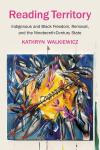
|
Reading Territory: Indigenous and Black Freedom, Removal, and the Nineteenth-Century State | The formation of new states was an essential feature of US expansion throughout the long nineteenth century, and debates over statehood and states' rights were waged not only in legislative assemblies but also in newspapers, maps, land surveys, and other forms of print and visual culture. Assessing these texts and archives, Kathryn Walkiewicz theorizes the logics of federalism and states' rights in the production of US empire, revealing how they were used to imagine states into existence while clashing with relational forms of territoriality asserted by Indigenous and Black people. |
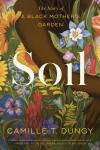
|
Soil: The Story of a Black Mother's Garden | In Soil: The Story of a Black Mother’s Garden, poet and scholar Camille T. Dungy recounts the seven-year odyssey to diversify her garden in the predominantly white community of Fort Collins, Colorado. When she moved there in 2013, with her husband and daughter, the community held strict restrictions about what residents could and could not plant in their gardens. |
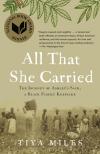
|
All That She Carried: The Journey of Ashley’s Sack, A Black Family Keepsake | In 1850s South Carolina, an enslaved woman named Rose faced a crisis, the imminent sale of her daughter Ashley. Thinking quickly, she packed a cotton bag with a few precious items as a token of love and to try to ensure Ashley’s survival. Soon after, the nine-year-old girl was separated from her mother and sold. Decades later, Ashley’s granddaughter, Ruth, inherited the sack and embroidered it with just a handful of words that evoke her family’s sweeping story of loss and of love. It reads: |

|
Vanguard: How Black Women Broke Barriers, Won the Vote, and Insisted on Equality for All | Join us as Martha S. Jones offers a new history of African American women's political lives in America. In the standard story, the suffrage crusade began in Seneca Falls in 1848 and ended with the ratification of the Nineteenth Amendment in 1920. But this overwhelmingly white women's movement did not win the vote for most black women. Securing their rights required a movement of their own. Jones will recount how African American women defied both racism and sexism to fight for the ballot, and how they wielded political power to secure the equality and dignity of all persons. |
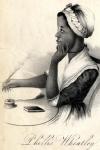
|
Phillis Wheatley Peters in Material Memory | 2023 marks the 250th publication anniversary of Phillis Wheatley Peters’ Poems on Various Subjects, Religious and Moral. Throughout this anniversary year, The Genius of Phillis Wheatley Peters: A Poet and Her Legacies, a project directed by the University of Georgia and Texas Christian University, honors the occasion as a milestone in both literary and historical terms generating countless cultural legacies. |
| In Search of Phillis Wheatley | Phillis Wheatley was only about 7 years old when she stepped off a slave ship in Boston harbor in 1761. She rose from the indignity of enslavement to earn international celebrity, only to die in obscurity and poverty. As the first person of African descent and the second woman in America to publish a book, Wheatley wrote remarkable contributions on topics ranging from religion to politics. Wheatley is now widely recognized as the mother of African-American literature. |
|
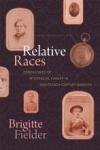
|
Relative Races: Genealogies of Interracial Kinship in Nineteenth-Century America | In Relative Races, Brigitte Fielder presents an alternative theory of how race is ascribed. Contrary to notions of genealogies by which race is transmitted from parents to children, the examples Fielder discusses from nineteenth-century literature, history, and popular culture show how race can follow other directions: Desdemona becomes less than fully white when she is smudged with Othello's blackface, a white woman becomes Native American when she is adopted by a Seneca family, and a mixed-race baby casts doubt on the whiteness of his mother. |
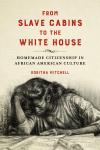
|
From Slave Cabins to the White House: Homemade Citizenship in African American Culture | Koritha Mitchell analyzes canonical texts by and about African American women to lay bare the hostility these women face as they invest in traditional domesticity. Instead of the respectability and safety granted white homemakers, black women endure pejorative labels, racist governmental policies, attacks on their citizenship, and aggression meant to keep them in "their place." |